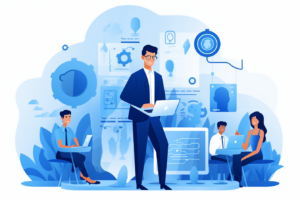How to adjust your talent management for the AI paradigm shift
- 5 Min Read
David Doe, VP of Talent Strategy & Excellence, Shell, explores how generative AI and LLMs shift skill requirements and how HR can craft a future-of-work-ready skills journey for selecting, developing, and engaging employees
- Author: David Doe
- Date published: Aug 11, 2023
- Categories


At the beginning of each year, there is a flurry of articles on the “next” HR trend or zeitgeist that will transform business and the HR function, from The Great Resignation” to Gen Z. Often, commentators overstate or sensationalize these narratives, leading to misconceptions about their true impact.
When you look more closely, very little empirical evidence is given as to the underlying drivers, and the advice given will have organizations working on the wrong things.
In contrast, the AI paradigm shift brings profound implications. All organizations must think about how they will use this technology and what it means for their employees.
How large language models (LLMs) impact skill requirements
Recent research from MIT highlights the productivity-boosting potential of Large Language Models (LLMs).
These models narrow the productivity and quality distribution (benefiting the lowest ability most, and doing little for those with the highest ability) and reshape the nature of tasks within a job. However, LLMs are not infallible. They possess the capacity to pass exams and provide professional advice, but they can also produce false synthetic content and exhibit limitations in causal inference. AI is moving at a pace and Stanford University suggests most LLMs do not yet comply with the draft EU AI act.
The integration of Language Model Models (LLMs) appears inevitable and with it the balance of tasks in jobs will undergo a significant transformation, leading to new skill requirements. For instance, let’s consider the role of a content writer.
Currently, they may spend a substantial amount of time on research, drafting, and editing content manually. An LLM can swiftly generate accurate and engaging content based on given prompts or guidelines. This shift in task balance allows content writers to dedicate more time to strategic thinking, creativity, refining the overall content strategy, and ensuring a compelling human narrative.
Strong communication skills will be crucial for effectively collaborating with LLMs and ensuring the human touch is retained in the final content.
The AI paradigm shift impacts our approach to talent management
In this hyper-productive landscape, it is the quality of the worker—their ideation, problem-solving abilities, curiosity, and communication skills—that becomes the true differentiator. Technical skills, once paramount, are no longer the primary basis of distinction, necessitating a reevaluation of how we value, evaluate, select, and certify talent.
We must address the practical implications of this shift, including different learning modalities, knowledge management, managing burnout, and worker concerns about employability.
While I believe in the value of skills in the workplace, I remain skeptical about the notion that all enterprises will become skill-based organizations. It is unlikely that traditional job roles will disappear entirely, given that we have built job taxonomies and employment laws around them. Instead, it is more likely most organizations will adopt a hybrid approach, incorporating various organizational models.
Five steps for transitioning your talent management strategy for the AI paradigm shift
Notwithstanding, AI-enabled skills may be the key to adapting and thriving in a rapidly evolving world. A comprehensive understanding of changing skills in the market empowers organizations to adapt workforce planning strategies and grasp how AI impacts the time spent on various tasks within jobs, enabling them to identify “o-ring” skills—those that are crucial for success. Job design and personalization of career advice, learning pathways, and job recommendations become essential for engagement and for individuals to be productive and feel they are safeguarding their employability.
Whilst AI-enabled skills technologies hold promise, there is no “silver bullet” technology solution currently available. If you are embarking on the AI-enabled skills journey, here are five practical tips:
- Think through your skills architecture: Use a single taxonomy and AI across different applications. Avoid replicating functionalities offered by your HCM. Having a single taxonomy will help with user adoption.
- Work out where you need skills and where competencies are required: Contrary to some statements that skills will replace competencies, this is wholly undesirable. Skills and competencies can coexist, particularly in safety-critical, ethical, and compliance contexts.
- Prioritise validity: Self-assessed, peer-assessed, or line manager-assessed skills lack validity. Instead, consider factors like length, breadth, and recency of experience to enhance credibility.
- Spend time organizing your job catalogue: Investing time in structuring your job catalog pays dividends in various areas, including pay and reward, talent, and learning initiatives.
- Partner closely with your ethics and compliance team: Ensure you look for bias by running statistical correlations.
The AI paradigm shift will be worth the struggle
The first Industrial Revolution started with the construction of the first factory and ended with the publication of the Communist Manifesto. Although transitions are challenging, history shows they are worthwhile in the long run.
Just as the first Industrial Revolution transformed society, our current transition holds immense potential. It is our responsibility as employers to embrace these possibilities and challenges, fostering innovation, driving productivity, and cultivating resilience and employability.
David Doe is VP of Talent Strategy & Excellence at Shell.








